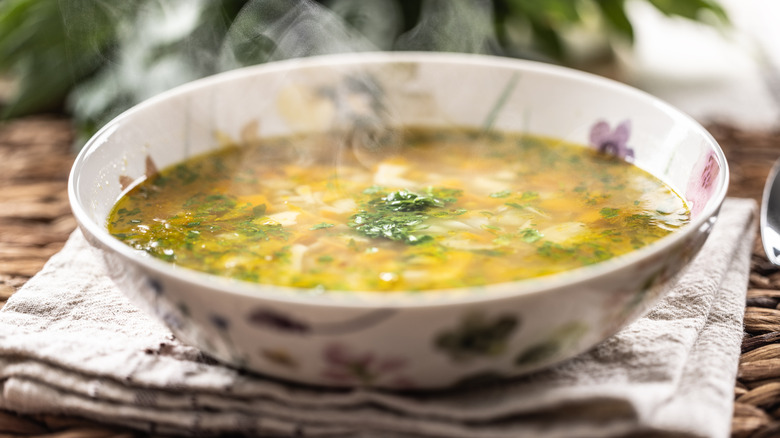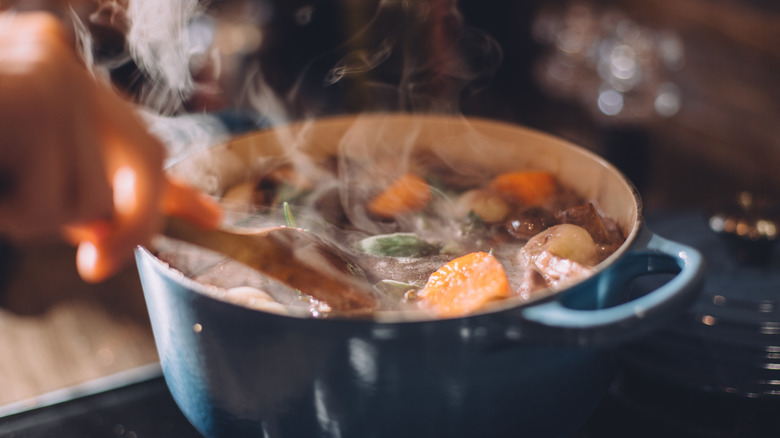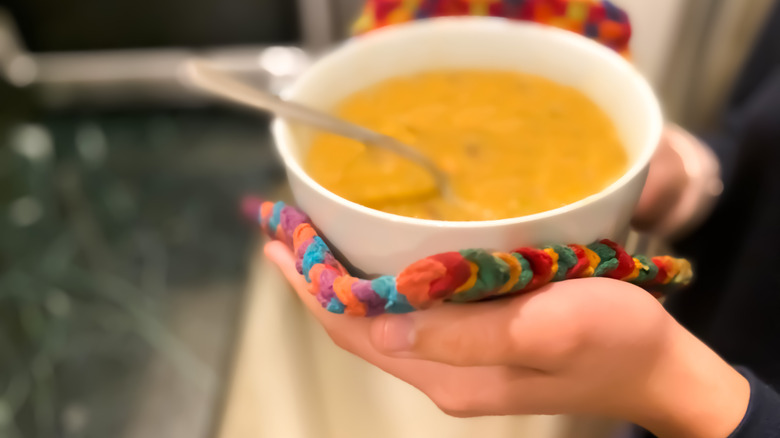The Reason Soup Always Tastes Better The Next Day
Soup lovers know that good things take time. Whether it's a slow, hours-long simmer or an overnight tenure in the fridge, the best soup recipes shine with the help of a little extra prep time. Leftover soup can be the star of the show — but why? The short answer is that the flavors have time to blend. The longer answer is that, on a molecular level, your soup is undergoing a series of small but impactful changes during its stay in the fridge.
Potatoes and other absorbent veggies have a chance to soak up that flavorful broth, while spices and seasonings can permeate the toothy ingredients more fully. Over time, liquid-soluble flavor compounds move from areas of higher concentration to lower concentration. For example, cooking beans in a soy sauce brine might help the beans absorb the flavor as they hydrate. But, after an overnight soak in that same marinade, those beans are going to be much more packed with flavor. After a day or two (or three), the overall flavor profile of a soup balances and deepens, becoming rounder and mellower.
Beyond absorption, a series of chemical processes like the Maillard reaction are also occurring over time. Starches and complex carbohydrates break down into simple sugars, sweetening the overall taste of your finished soup and taming spicy tones. On the savory side, proteins and fats break down into amino and fatty acids, steering the profile more umami.
Those interplaying flavors need a chance to meld
One foodie on Reddit asked, "does stew get better the next day?" The top reply to this question brings up another variable, this one more experiential than scientific. "I think for the person cooking it, a certain amount of palate/nose fatigue can always be a particularly noteworthy issue with long, slow cooking in terms of your experience actually tasting the food," Reddit user justanothercook commented. "The fact that stews withstand storage and reheating so well makes them somewhat unique in feeling 'fresh' to the cook after a quick reheat the next day."
Absence makes the heart grow fonder, and after a few hours or a full day away from your meticulously curated batch, home cooks can experience those flavors (which have become richer and deeper in the meantime) with new eyes. Making soup or stew the night (or a few days) in advance is also wicked convenient for meal prepping during busy weekdays. Especially if it's a slow-cooker soup, leftovers can serve as the hassle-free, low-prep gift that keeps on giving all week long. To help your leftovers stretch the extra mile, follow these tips on how to store soup.
Know the exceptions to the legendary leftovers rule
An overnight fridge stint can be all it takes for your soup's flavor profile to merge into a harmonious symphony ... key words "can be." There are a few exceptions to the leftovers-taste-better rule. Chili and other spicy soups tend to lose their brightness after a day or two in the fridge. The same is also true of bright acidic soups (think anything seasoned with lemon). In a tomato-based soup, the natural sweetness of the tomatoes rather than their acidity might become more pronounced on day three in the fridge. If your soup contains fresh herbs, adding a few sprigs to each reheated bowl can help the herbaceous flavor perform better and avoid getting lost.
Texturally, any soup made with an emulsion is liable to break over time, potentially becoming greasy instead of creamy after a few days in the fridge. Any soups thickened with cornstarch or containing eggs or a dairy-based broth might also need a little textural TLC on day three.


